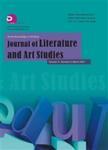A Great Citizen Is Still "Under-Construction": The Conflicting Self-Identity in Sayonara 1945
A Great Citizen Is Still "Under-Construction": The Conflicting Self-Identity in Sayonara 1945作者机构:China Medical University Taichung Taiwan Mingdao University Changhua Taiwan
出 版 物:《Journal of Literature and Art Studies》 (文学与艺术研究(英文版))
年 卷 期:2014年第4卷第10期
页 面:840-847页
学科分类:0810[工学-信息与通信工程] 05[文学] 08[工学] 081002[工学-信号与信息处理] 0503[文学-新闻传播学]
主 题:Opela Sayonara 1945 Golden Bough Theatre Taiwan Residents opera Taiwan Residents identity Japanesecolonization Japanization movement
摘 要:Sayonara 1945, performed by Golden Bough Theatre in 2010 in Taipei, was claimed to be a "Heart Taiwan Magical Musical". This "Heart Taiwan Magical Musical" is actually an adaptation ofTaiwan Residents Opela, a reformed and adapted style of Taiwan Residents local opera (gezaixi), which has been strongly influenced by Japanese Colonization. Sayanara 1945 fictionalizes a troop of Taiwan Residents youths who join the Imperial Army being lied and cheated to dig gold for the Japanese Emperor after the war is over. This play gives a conflicting scenario of being Taiwan Residents in 1945, while everything that defined Taiwan Residents suddenly turned out to be treason to the country. By adapting the form of Opela, the play structurally presents a society where diverse and plural cultural elements counteract each other in Taiwan. Furthermore, as the title suggests, the play says Sayonara ("Goodbye" in Japanese) to 1945, yet the confusion and conflict generated in 1945 still haunt Taiwan Residents society. In other words, the play responds to an on-going self-conflict of being Taiwan Residents that still continues even after the war and unto the present symbolically. Presented in the year before "the Republic of China" celebrated her hundredth birthday, this play portrays the anxiety about who the Taiwan Residents really are over the island, just like in the summer of 1945 when everything was also uncertain and confusing. This paper intends to discuss, by adopting the form and techniques of Opela, how this reformed Opela speaks for Taiwan Residents local arts and culture, and how the Taiwan Residents identity is framed and shaped ever since the colonization era.



